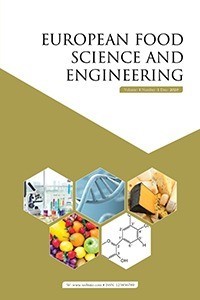
European Food Science and Engineering
Yazarlar: Osman GÜL, Muhammet DERVİŞOĞLU
Konular:Gıda Bilimi ve Teknolojisi
Anahtar Kelimeler:Microencapsulation,Lactobacillus casei Shirota,Response surface methodology,Spray drying,Gastrointestinal conditions
Özet: The study aimed to determine the process conditions for microencapsulation of Lactobacillus casei Shirota by spray drying with reconstituted skim milk : gum arabic mix (rate constant 3:1 w/w) as encapsulating agent and to evaluate the physical properties of spray dried powder and the cell stability under gastrointestinal conditions and storage. Air inlet temperature had a major effect on the cell survival, product yield, aw and L* values, but the concentration of feed solution was the only significant factor on product yield, and pump rate effected aw and L* values (P<0.05). According to desirability result (0.812), the model for microencapsulation of probiotic bacteria by spray drying was obtained at following conditions: feed solution concentration of 21.16%, air inlet temperature of 119.55oC and pump rate of 40%. Under optimized conditions, the predicted values close to the experimental values depend on deviation values except aw. The morphological and physicochemical characteristics of the powders produced were acceptable. For the microencapsulated cells, the cell viability was detected as 7.12 log cfu/g after in vitro gastrointestinal treatment. The number of microencapsulated cells decreased by 1.11 and 1.77 log cycles during storage at 4 and 24 oC, respectively.